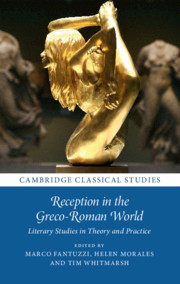Book contents
- Reception in the Greco-Roman World
- Cambridge Classical Studies
- Reception in the Greco-Roman World
- Copyright page
- Dedication
- Contents
- Figures
- Notes on Contributors
- Acknowledgements
- Abbreviations
- Altered States: Cultural Pluralism and Psychosis in Ancient Literary Receptions
- Part I Archaic and Classical Poetics
- Part II Classical Philosophy and Rhetoric, and Their Reception
- Chapter 5 On Coming after Socrates
- Chapter 6 Chimeras of Classicism in Dionysius of Halicarnassus’ Reception of the Athenian Funeral Orations
- Chapter 7 ‘Our Mind Went to the Platonic Charmides’: The Reception of Plato’s Charmides in Wilde, Cavafy, and Plutarch
- Chapter 8 Naked Apes, Featherless Chickens, and Talking Pigs: Adventures in the Platonic History of Body-hair and Other Human Attributes
- Part III Hellenistic and Roman Poetics
- Part IV Multimedia and Intercultural Receptions in the Second Sophistic and Beyond
- References
- Index
Chapter 5 - On Coming after Socrates
from Part II - Classical Philosophy and Rhetoric, and Their Reception
Published online by Cambridge University Press: 05 June 2021
- Reception in the Greco-Roman World
- Cambridge Classical Studies
- Reception in the Greco-Roman World
- Copyright page
- Dedication
- Contents
- Figures
- Notes on Contributors
- Acknowledgements
- Abbreviations
- Altered States: Cultural Pluralism and Psychosis in Ancient Literary Receptions
- Part I Archaic and Classical Poetics
- Part II Classical Philosophy and Rhetoric, and Their Reception
- Chapter 5 On Coming after Socrates
- Chapter 6 Chimeras of Classicism in Dionysius of Halicarnassus’ Reception of the Athenian Funeral Orations
- Chapter 7 ‘Our Mind Went to the Platonic Charmides’: The Reception of Plato’s Charmides in Wilde, Cavafy, and Plutarch
- Chapter 8 Naked Apes, Featherless Chickens, and Talking Pigs: Adventures in the Platonic History of Body-hair and Other Human Attributes
- Part III Hellenistic and Roman Poetics
- Part IV Multimedia and Intercultural Receptions in the Second Sophistic and Beyond
- References
- Index
Summary
Socrates presents particular challenges to reception studies for the obvious reason that he did not write anything and thus left no textual corpus for posterity to receive. It is instead his own body (corpus) that often becomes the focal point of reception. This chapter examines the reception of Socrates in the works of Isocrates. Unlike other Socratics who had direct access to Socrates and left careful portraits of the philosopher from a group of like-minded admirers, Isocrates offers an interesting insight into the way in which Socrates (both his physical presence and his turning into an imaginary model figure) was perceived to have shaped the cultural and philosophical landscape in Athens. Though sometimes also counted among Socrates’ admirers, this chapter argues that Isocrates’ works offer a fundamentally critical reflection on Socrates and his teacher role in Athens. This critical insight becomes a key motivation for Isocrates’ own work and there is indeed much at stake: according to Isocrates, Athens is need for a new teacher and philosopher figure (Isocrates himself) who would supplant the statuesque Socrates.
- Type
- Chapter
- Information
- Reception in the Greco-Roman WorldLiterary Studies in Theory and Practice, pp. 121 - 144Publisher: Cambridge University PressPrint publication year: 2021
- 1
- Cited by

